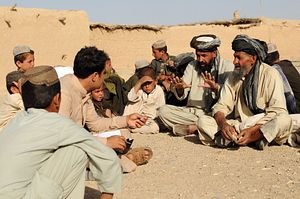Saturday, ten Hazaras were kidnapped in Zabul provinces along the highway. Local authorities believe this particular incident was perpetrated by a local Taliban commander. Earlier this month in the same province however, seven Hazaras were beheaded, apparently by militants aligned with ISIS. Located in southeastern Afghanistan and bisected by a major highway that links Kabul to Kandahar, Zabul and the plight of the Hazaras highlight the fractious nature of militant groups in Afghanistan and the very broad range of motives for such kidnappings.
According to Khaama Press, General Mirwais Noorzai, the southern Zabul police chief, said that the latest batch of hostages were taken by Mullah Taqwa, a local Taliban commander. Noorzai said that the Hazaras were taken because a group of Hazaras stole a flock of Taliban sheep. Both Khaama and TOLOnews reported the sheep story. TOLOnews cites unsourced reports that Taqwa “has demanded the return of more than 400 sheep in exchange for the hostages.”
Tuesday, as reported by TOLOnews, the chief of the National Directorate of Security (NDS), the Afghan intelligence agency, said at a press conference that local elders are negotiating for the release of the hostages.
The Hazaras, Afghanistan’s third-largest ethnic group (after Pashtuns and Tajiks), mostly live in central Afghanistan. The Shia Hazaras were persecuted by the Sunni Taliban regime throughout the 1990s and groups affiliated with ISIS that have emerged over the past few months in Afghanistan have followed suit.
Taliban spokesman Zabihullah Mujahid, quoted by the Wall Street Journal, denied the group’s involvement in the recent kidnappings. Zabul, and events there, highlight the chaotic matrix of militant groups in Afghanistan. The WSJ notes the appearance of groups affiliating themselves with the ISIS along with the splintering of the Taliban:
In recent months, rival Taliban groups have been battling each other in lawless parts of Zabul province, adding to security concerns.
Militants loyal to the group’s recently-appointed head, Mullah Akhtar Mansour, are fighting others who reject his leadership and whose tactics are more violent.
Uzbek militants are also active in Zabul, and have been accused of targeting Hazaras in the area.
The Hazaras seem to be the choice target regardless of which militant group is doing the targeting. Groups affiliated with ISIS, which the New York Times notes have little apparent operational ties to the original ISIS in Syria and Iraq, have borrowed that group’s branding and brutal tactics. Among the seven hostages found beheaded earlier this month were two children. The bodies were discovered by the Taliban, who had been fighting with the ISIS-affiliated militants and Taliban defectors, and local elders, who negotiated the return of the bodies. In Zabul, we see the flaring of local problems (such as sheep-theft) within the context of national struggles (the battle between the central government and the Taliban for governance). These issues are exacerbated by intragroup tension (fighters who have defected from the Taliban claim Mullah Mansour murdered Mullah Omar), regional politicking (Pakistan’s role in hiding the death of Mullah Omar derailed its warming relations with the Afghan government), and the reemergence of violent movements with global ambitions (ISIS).
































